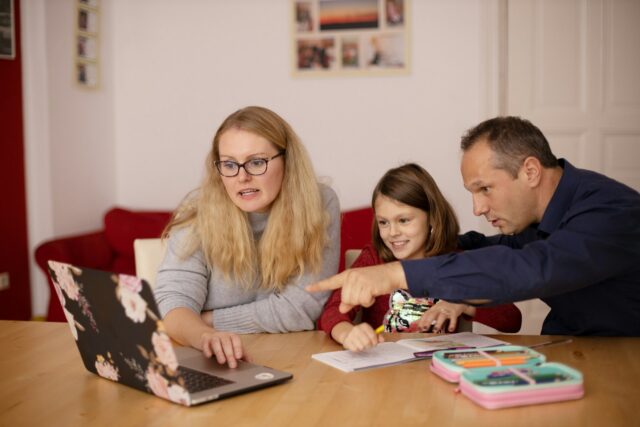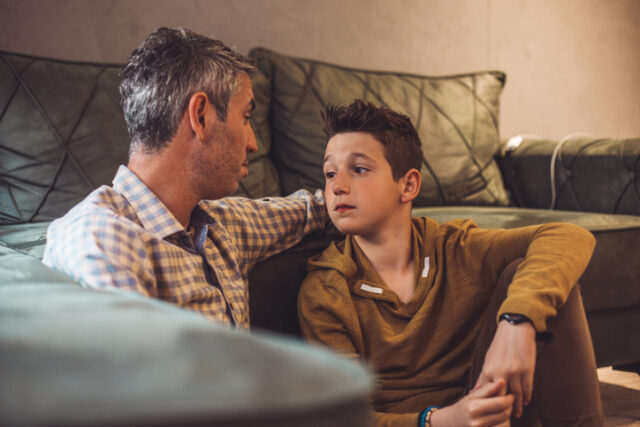Not all kids grow up surrounded by their peers.

Many children spend a lot of their youth surrounded by adults rather than people their own age, and that definitely shapes their personality and behaviour in life. These kids tend to be a bit precocious, picking up on adult habits, perspectives, and communication styles, which makes them stand out in some pretty unique ways. Because of this, it makes a lot of sense that there are certain traits that are common among those who had this experience.
1. They communicate like adults.

Kids who are around adults a lot pick up their way of talking pretty quickly. They might start using more mature language, being able to articulate their thoughts better, and picking up on subtle hints in conversation. While it makes them confident speakers, it can sometimes make them feel out of place when they’re with kids their own age, who might not always get their style of communication.
2. They develop emotional maturity early.

Being around adults means these kids are exposed to more complex emotions and real-life challenges. Watching adults handle difficult situations gives them the chance to develop empathy, self-awareness, and emotional intelligence sooner than most. But sometimes, it can also make them feel like they’re carrying emotional weight that other kids their age don’t seem to have to deal with.
3. They prefer meaningful conversations.

Small talk is not their thing. These kids are used to deeper, more thoughtful discussions with adults, so they often crave conversations that challenge their minds or stir their curiosity. Fluffy banter might not hold their attention, and they’re more likely to connect with people who can meet them at their level.
4. They’re more observant.
 Source: Pexels
Source: Pexels Kids raised around adults often become expert listeners. They watch how people act, noticing little things like body language or the tone of a conversation. It can make them incredibly intuitive, but it can also lead to overthinking or reading too much into situations, especially when it comes to group dynamics.
5. They act responsibly from a young age.
 Source: Unsplash
Source: Unsplash With adults as role models, these kids often start taking on responsibilities early. They might do things around the house or take on roles that show they’re dependable. While this makes them reliable, it can also mean they miss out on some of the carefree fun other kids get to experience.
6. They can feel older than their age.

Spending more time with adults can make these kids feel like “old souls.” They often take on the habits and perspectives of older people, which can make it hard for them to connect with peers who haven’t had similar experiences. Sometimes, this leaves them feeling a bit isolated or like they don’t quite fit in with other kids their age.
7. They value structure and routines.

Adults often run on schedules, and kids who grow up around them tend to adopt the same need for structure. They’re more likely to feel comfortable with routines and prefer organised environments. That said, they might struggle with anything too spontaneous or unstructured, which can make certain social situations feel a little chaotic for them.
8. They have an advanced vocabulary.
 Source: Unsplash
Source: Unsplash Because they’re surrounded by adult conversations, these kids are often exposed to more complex language. As a result, they tend to develop an impressive vocabulary early on, making them stand out in class or in work settings. But, at the same time, this can make them come off as overly formal when they’re interacting with peers who aren’t as polished.
9. They can struggle with playfulness.

While these kids may excel in thoughtful, mature conversations, they often find it harder to engage in playful, spontaneous fun. They tend to approach things with a more serious attitude, which can make it hard to bond with kids who just want to have fun or mess around. Sometimes, they can feel like the party poopers in social settings.
10. They develop strong critical thinking skills.

Spending time with adults means being part of conversations where decisions are made, and ideas are challenged. These kids learn to analyse situations and think critically about things from a young age. Their sharp thinking helps them solve problems and think ahead, but it can sometimes make them overanalyse simple situations or overcomplicate things when they don’t need to.
11. They’re more independent.

These kids often learn to rely on themselves more than their peers do. Since they’re used to adult interaction, they don’t typically look to peer groups for validation or support. While this makes them independent, it can also make them seem distant or reluctant to collaborate, which can create misunderstandings in group settings.
12. They’re comfortable around authority figures.

Having spent so much time around adults, these kids aren’t intimidated by authority figures like teachers or managers. They know how to communicate effectively with people in charge, which often comes across as mature and confident. Later in life, this can be a big advantage in professional environments, where they’re comfortable speaking up and asserting themselves.
13. They have a strong sense of empathy.

Being around adults means they’re exposed to a wider range of emotions and perspectives. As a result, these kids tend to develop a deep sense of empathy, easily picking up on how other people feel. That ability makes them great friends and companions, though they can sometimes get emotionally drained by constantly taking on everyone else’s feelings.
14. They take feedback well.

Kids raised by adults are often given more constructive feedback, whether they like it or not. As a result, they learn to accept criticism without taking it personally. Instead of viewing feedback as a negative, they see it as an opportunity for growth. Having that kind of attitude makes them open to learning and growing in both personal and professional settings.
15. They tend to be more introspective.

Spending time around adults gives these kids plenty of time to reflect on their place in the world. They often think deeply about their experiences, their relationships, and the bigger picture of life. While introspection can lead to greater self-understanding, it can also make them more prone to self-criticism or feeling like they don’t fit in with other people.




